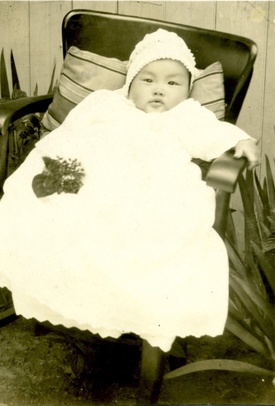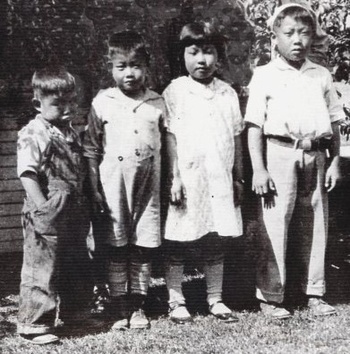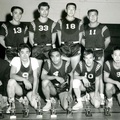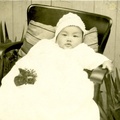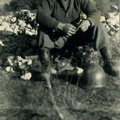James Tatsushi Ukita was born on December 14, 1920 being one of four children of Frank Masashi Ukita (Grandpa) and Tsuya Ukita (Grandma). He was called Tachi by his parents and Tachi, Tach, or Jim by his two brothers and sister. When he was born, he weighed 12 pounds—what a baby!!!! Tachi ended up being 5 ft. 8 inches—the tallest in their family.
He must have been a real happy baby and kid. He had those twinkling eyes as shown in his baby photo—what an endearing smiling baby!!!!
A photo of Tachi, younger brother Hiro, older sister Yochi, and older brother Charlie (my Dad) as kids—they looked like they were in the “Our Gang” group of kids, like Alfalfa, Spanky, Butch, and Buckwheat as seen in those old classic Hollywood comedy movies.
Tachi told me that when he and Hiro were kids, they did some pretty mischievous things. Maybe in the above first paragraph, I should have written he was a “disarming endearing smiling baby!!!!” The Japanese word for a mischievous/rascal kid is “warukozo” which they both were at times. They got into all kinds of mischief.
He said that in their South Central Los Angeles basement on 24th Street they had hid a penny gumball machine taken from a store front: Actually, “swiped” was the exact word he used. Evidently, they took out the gumballs and pennies, and one night returned the machine to the store. I think they returned the machine back to the store!! Otherwise, they’d get scolded, spanked, and disciplined by Grandma and Grandpa if the machine were to be found on the home property; and all four would have to bring the machine back to the store to ask the owner for forgiveness.
To put Tachi’s and Hiro’s mischievous behavior into a similar perspective of those times, I’ll share a little bit about Louie Zamperini.
In the best-selling inspirational 2010 book Unbroken, the life of Louie Zamperini is superbly written by Laura Hillenbrand. Louie Zamperini was a phenomenal 1930s high school track star from Torrance High School. He qualified to run in the 1936 Berlin Olympics.
The book tells how mischievous Zamparini was growing up in Torrance during the Great Depression. Torrance is located about 15 miles southwest of South Central Los Angeles. Zamperini did warukozo things like Tachi and Hiro. As a young boy, he broke into a home and stole food from an ice box, also stole food from a local bakery, and stole coins from a local movie house telephone machine. Zamperini became an outstanding teenage long distance runner. His running talent was enhanced from running fast and far away from the scenes of his bad deeds.
He became a war survivor and hero. He spent over 46 days in a life raft in the Pacific Ocean before being rescued/captured by the Japanese. He was cruelly beaten during his two year capture in Japan prisoner of war camps. He was filled with hatred towards the Japanese and especially towards one prison guard who beat him and made his life totally miserable.
His hatred towards the Japanese persisted several years after the War. Encouraged by his wife, he attended a 1949 Billy Graham meeting in Los Angeles. The result was to change his life ridding him of the hatred. He dedicated his life to be a forgiving, helpful individual, doing God’s Christian missionary work even in Japan. Louie Zamperini provided deep Christian caring and memorable mentorship to many. Today, Torrance High School's sports stadium is called Zamperini Stadium.
Also attending Torrance High School prior to the War was Ted Tanouye. Tanouye was to become a member of the Japanese American 442nd/100th Battalion Regimental Combat Team. In Italy, during 1944, he was killed in action. At that time he was awarded the Distinguished Service Cross (DSC). In the year 2000, his DFC was upgraded to the Medal of Honor. Louie Zamperini, in a Los Angeles Times article, said that the Torrance High School stadium should have been named for a real hero like Ted Tanouye and not for him.
Now back to Uncle Tachi. Like his older brother Charlie (my Dad), he attended 28th Street Elementary School, John Adams Junior High School, and one or two years at Jefferson High School. When the family moved from East 24th street to East 64th Street, Tachi attended Huntington Park High School.
Tachi developed a great sense of humor. In his sister’s (Yochi) 1935 Polytechnic High School yearbook when he was 14 years old, he kiddingly wrote with likely the same twinkle in his eyes as seen in his baby photo, the following:
Roses are red violets are blue monkeys like you should belong in a zoo.
Love,
James T. Ukita
p.s. Forget me not
Tachi had a unique accent maybe somewhat similar to a Southern Accent. Possibly he acquired that as a youngster while attending 28th Street Elementary School and John Adams Junior High School where maybe friends from the South spoke that way. His brothers and sister didn’t have that kind of accent. Tachi most definitely had a neat, humorous, and unique way of expressing words—often with a wink of his eye.
At Huntington Park High School, he was co-captain of the JV basketball team with Tex Winter. Tex Winter became an excellent college basketball player after the War. He became head basketball coach at Kansas State University. Later he was the assistant coach for the Los Angeles Lakers where his suggested version of the triangle offense was employed by Phil Jackson, head coach of the Lakers.
Tachi told me that after growing taller from 5 feet 3 inches to 5 feet 8 inches he was asked to play for local Los Angeles Japanese American basketball teams such as the Cardinals. The Cardinals played in the Japanese Athletic Union (JAU) prior to the War.
Not long after the Japanese attack on Pearl Harbor, the Frank Ukita family was bound for incarceration at Manzanar. Starting on April 1, 1942, they resided in Block 4, Building 11, and Units 1 & 2. Grandpa, Grandma, Yochi, Tachi, and Hiro were assigned to Unit 1; and my Dad and Mom, with two small kids to Unit 2. Each unit in a Manzanar barrack building was about 20 feet by 25 feet in overall dimensions. This was pretty tight living quarters for five adults in Unit 1 with no bathroom in the building. However, sad to say, some Americans to this day would say, “What should Japanese incarcerees expect for free room and board?” Similar kinds of thoughts never go away. Sadly, even today, one can still hear and read about such views concerning similar circumstances.
Tachi was able to leave Manzanar in 1943 when he was hired to become a machinist in Chicago. After working at the machine shop, he was able to get a similar position for Dad. So, by early 1944, both Charlie and Tachi were working at the same place in Chicago. Mom, my younger sister, Charlene, and I traveled on to Chicago in late March 1944.
In Chicago, the Charlie Ukita family was living in an apartment building on Windsor Street. This apartment was on the far north side of Chicago, not far from Lincoln Park. Tachi lived in this apartment building as well. Tachi was a young, working, fancy-free bachelor. He was making good money as a machinist and would go out on the town with his friends, like Ben Ito.
I still remember both Tachi and Ben going out on the town wearing their pork-pie hats with the brims turned upward all around—like those college kids you see in those old Hollywood movies of the 30’s and early 40’s. They would go out to pool halls, go to dances, played poker and pinochle games with their friends. They had some real loose change in their pockets and bills in their wallets.
Sadly, Ben Ito’s younger 17 year-old brother, James, was one of two Manzanar incarcerees killed by Army MPs’ gun fire. At the same time, nine others were wounded by the MP gun fire. James wanted to see what was the disturbances/protests/commotions were about during the night of December 6, 1942. A crowd of about 500 had gathered at the Manzanar police building. The building was guarded by about twelve Army MPs who eventually fired their weapons at the crowd of people.
In Chicago, Tachi got his military draft notice near the end of the War. Then there were two Ukita young men in the Army. However, unlike his brother, Hiro, Tachi didn’t have to go overseas while in the Army. He was stationed at places within the States. I remember him telling me he was at Fort Lewis, Washington—probably for basic training.
From Fort Lewis he said he was supposed to catch a boat to Los Angeles. But, he got seasick on boats so he decided to catch a train instead. Tachi and Dad didn’t inherit the love of the sea like their father or Hiro. Sea stories from their dad were not things they well remembered. All they knew: don’t get me on that boat—they didn’t like being rocked-and-rolled—getting seasick!!!!
Tachi was discharged from the service in about 1947, coming back to Chicago to live and work. There he met his wife, May Kawashima. Her parents were friends of Grandpa’s and Grandma’s. They were all from Okayama Prefecture in Japan.
So, Tachi married May in about 1949. They eventually lived on Fremont Street near Waveland Avenue on the north side of Chicago. The Charles Ukita family lived in this same apartment building from about 1946 to about 1949; moving out in 1949 to a purchased house at 3642 N. Wilton Street near Wrigley Field (Cubs Park). The Fremont apartment was owned by the Kawashima family and was about two blocks away from our new home. So, we would see Tachi and May. Especially, we would often see Tachi.
He loved eating the homemade biscuits that Mom made and, also, those Japanese steamed manju that Grandma made. I think he had some kind of built-in radar system. Even from two blocks away he could smell them making these bakery items. He would be over as quick as lightening when the biscuits and manju were still hot on the plates. He mentioned that as a kid he loved butter, and would get a spoon and fill it with butter and eat it. I couldn’t believe what he was saying for I didn’t think anyone loved butter that much, but he sure loved heaping that butter on Mom’s biscuits.
* This paper is a shortened and revised version of what was written about Tachi in the author’s book about his family, Pillars of a Sansei’s Family, published in 2013.
© 2013 Russell Tadao Ukita


